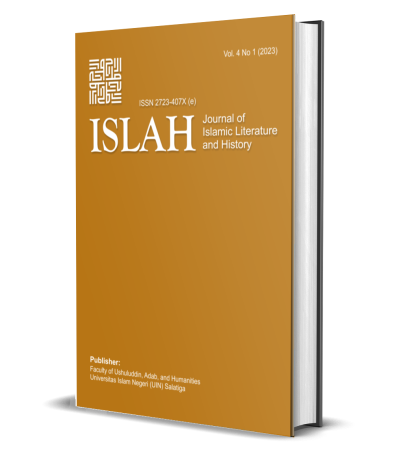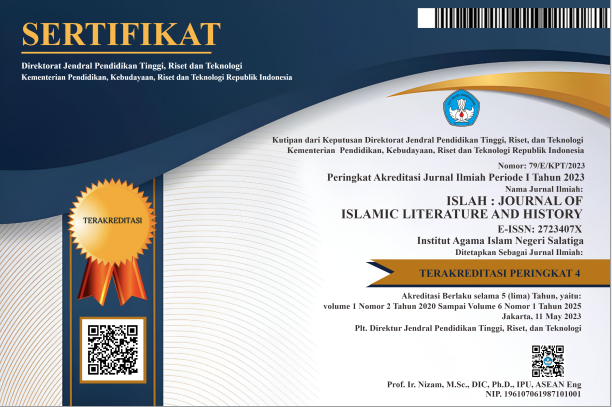Code Mixing in Arabic Posts of Korean Pop Fans in TIKTOK Account
DOI:
https://doi.org/10.18326/islah.v5i1.19-34Keywords:
code-mixing, tiktok, korean pop fansAbstract
This article aims to describe the form of Arabic code mixing by Korean pop fans on Tiktok comments column. All data presented is obtained from observations in Tiktok accounts linked to the author's personal account. The observation data is in the form of sentences that contain mixed codes that appear on short videos of Korean pop fans' accounts in the form of captions, comments and sentences in videos. The data collection method used in this study is an observation method with screen capture techniques and note-taking techniques. The findings of the data are then analyzed and presented with a qualitative description explanation. From the results of the study, it appears that the mixed code contained in the Arabic uploads of Korean pop fans on Tiktok accounts is a type of mixed foreign language code or mixed code outward (outer code mixing). Based on the results of the analysis, it shows that in Arabic uploads on TikTok accounts, the Korean Pop fans use a mixture of codes by inserting elements of English and Korean in their uploads. The use of mixed codes of English elements is most predominantly found. The meaning of the mixed code consists of a denotative meaning, namely the actual meaning and the connotative meaning that refers to the distinctive meaning prevailing in the Korean Pop fan community.
References
Andriani, Asna. ‘FRASA DALAM BAHASA ARAB (Konstruksi Frasa Dalam Bahasa Arab Berdasarkan Unsur Kata Pembentuknya)’. CENDEKIA : Jurnal Studi Keislaman 2, no. 1 (22 April 2018). https://doi.org/10.37348/cendekia.v2i1.24.
Basalom, B. ‘Demand for K-Pop Band Super Junior’s Saudi Concert Crashes Site, Tickets Sell Out in Ours’, 2019. https://www.thenational.ae/arts-culture/music/demand-for-k-pop-band-super-junior-s-saudi-concert-crashes-site-tickets-sell-out-in-hours=1.882588.
Chaer, Abdul, and Leonie Agustina. Sosiolinguistik: suatu pengantar. Jakarta: Rineka Cipta, 1995.
Golchinnezhad, Maryam, and Mahmoud Afrouz. ‘Sociolinguistic Analysis of Persian Dubbed Movies’. Journal of Intercultural Communication Research 51, no. 3 (4 May 2022): 254–70. https://doi.org/10.1080/17475759.2021.1946839.
Jin, Dal Yong. ‘An Analysis of the Korean Wave as Transnational Popular Culture: North American Youth Engage Through Social Media as TV Becomes Obsolete’, 2018, 19.
Kridalaksana, Harimurti. Kamus Linguistik. Ed. 4. Jakarta: Gramedia Pustaka Utama, 2008.
Laiman, Akhiri, Ngudining Rahayu, and Catur Wulandari. ‘Campur Kode Dan Alih Kode Dalam Percakapan Di Lingkup Perpustakaan Universitas Bengkulu’. Jurnal Ilmiah KORPUS 2, no. 1 (6 August 2018): 45–55. https://doi.org/10.33369/jik.v2i1.5556.
Lenaini, Ika. ‘Teknik Pengambilan Sampel Purposive Dan Snowball Sampling’. Historis: Jurnal Kajian, Penelitian & Pengembangan Sejarah 6, no. 1 (June 2021): 33–39. https://doi.org/doi.org/10.31764/historis.vXiY.4075.
Nababan, P.W.J. Sosiolinguistik Suatu Pengantar. Jakarta: Gramedia Pustaka Utama, 1984.
Park, Jungho. How to Speak K-Pop: Mastering The Most Popular Korean Words from K-Pop and Talking Like A Real Fan. Sheridan, WY: Cambridge Dynasty Press, 2020.
Rahardi, R. Kunjana. Kajian Sosiolinguistik: Ihwal Kode Dan Alih Kode. Ciawi, Bogor: Ghalia Indonesia, 2010.
Sarwono, Jonathan. ‘Memadu Pendekatan Kuantitatif dan Kualitatif: Mungkinkah?’ 9, no. 2 (Mei 2009): 119–32.
Wijana, I. Dewa Putu, and Muhammad Rohmadi. Sosiolinguistik: Kajian Teori Dan Analisis. Cet. 1. Yogyakarta: Pustaka Pelajar, 2006.
Yulius, Hendri. Kamus Gaul Istilah K-Pop. Jakarta: Gramedia Widiasarana Indonesia, 2013.
Zaim, M. Metode Penelitian Bahasa: Pendekatan Struktural. Padang: Sukabina Press, 2014.
Downloads
Published
Issue
Section
License
Copyright (c) 2024 Alfia Rohmah

This work is licensed under a Creative Commons Attribution-ShareAlike 4.0 International License.
Copyright
Authors retain copyright and grant the journal right of first publication with the work simultaneously licensed under a Creative Commons Attribution-ShareAlike 4.0 International License. In line with the license, authors are allowed to share and adapt the material. In addition, the material must be given appropriate credit, provided with a link to the license, and indicated if changes were made. If authors remix, transform or build upon the material, authors must distribute their contributions under the same license as the original.
Licensing

This work is licensed under a Creative Commons Attribution-ShareAlike 4.0 International License.








